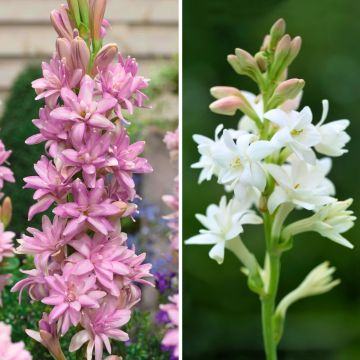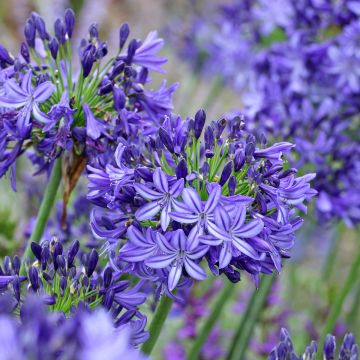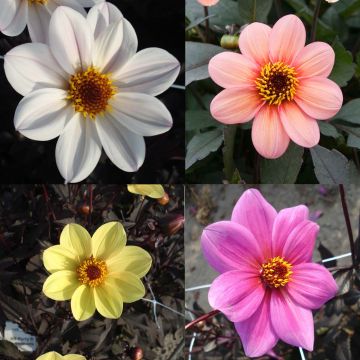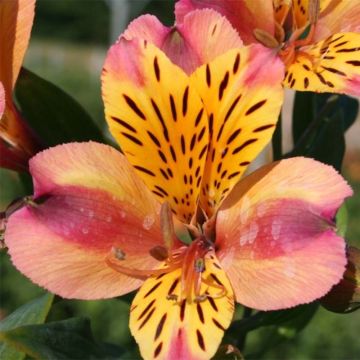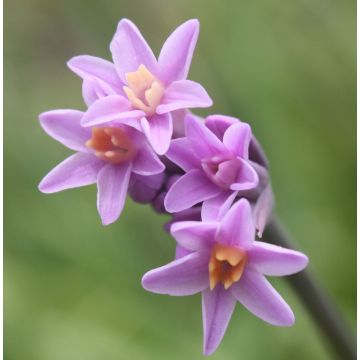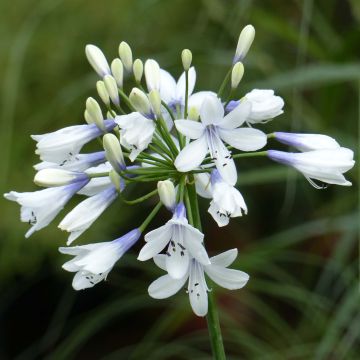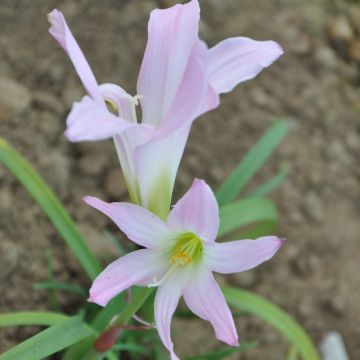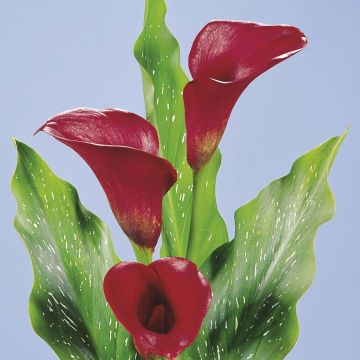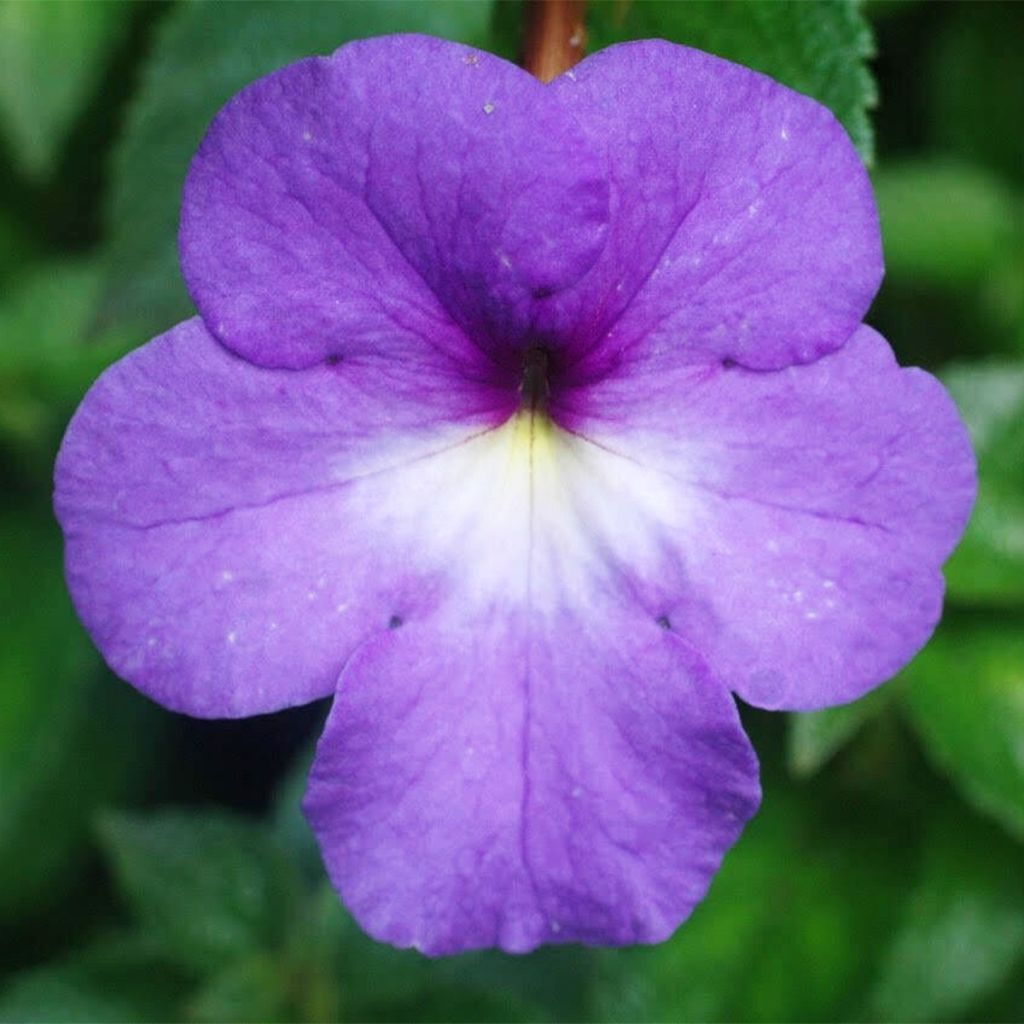

Achimenes Bleu
Achimene Blue - Magic Flower
Achimene x hybridum Bleu
Cupid's Bower, Hot Water Plant, Magic Flower
Completely dried out bulbs reduced to dust, impossible to plant.
eric, 26/03/2024
Special offer!
Receive a €20 voucher for any order over €90 (excluding delivery costs, credit notes, and plastic-free options)!
1- Add your favorite plants to your cart.
2- Once you have reached €90, confirm your order (you can even choose the delivery date!).
3- As soon as your order is shipped, you will receive an email containing your voucher code, valid for 3 months (90 days).
Your voucher is unique and can only be used once, for any order with a minimum value of €20, excluding delivery costs.
Can be combined with other current offers, non-divisible and non-refundable.
Home or relay delivery (depending on size and destination)
Schedule delivery date,
and select date in basket
This plant carries a 6 months recovery warranty
More information
We guarantee the quality of our plants for a full growing cycle, and will replace at our expense any plant that fails to recover under normal climatic and planting conditions.
Would this plant suit my garden?
Set up your Plantfit profile →
Description
The Blue Achimenes, often cultivated indoors, is a highly decorative tropical plant, appreciated for its endless and beautifully coloured flowering. Each flower, in a lovely violet-blue trumpet shape, only lives for a few days, but they continuously renew themselves for several months on flexible and gracefully trailing stems. To create a beautiful pot or fill a hanging basket, we recommend planting several rootstocks together. You can place it outdoors on the terrace or in the garden, in a gently sunny and sheltered spot. The plant rests during winter, protected from the cold, almost dry, and in semi-shade.
Achimenes x hybridum, or Achimenes, belongs to the Gesneriad family. It is a rhizomatous plant native to tropical America, the Caribbean, Mexico, and Guatemala, which fears temperatures below 10°C. In nature, it is found in somewhat humid and semi-shaded places, anchored to stone walls or rocks, sometimes at high altitudes. Introduced to Europe in the 19th century, different species have been hybridized, giving rise to lovely varieties intended for verandas and interiors. The reserve organ is a tuberous root. Eventually, the plant forms a rounded and trailing clump that measures about 30-40cm (12-16in) in height and 40-50cm (16-20in) in width. Vegetation starts in spring, consisting of flexible and slightly brittle stems carrying ovate and pointed leaves, measuring between 3 and 5cm (1 and 2in) wide, slightly hairy, with toothed edges, and dark green in colour. Flowering usually begins in May and continues until September-October. The flowers, 3 to 5cm (1 to 2in) in diameter, consist of a long tube that opens into a 5-petal corolla. The foliage naturally dries up in autumn, after flowering. It is then time to dig up the rootstocks and store them, for example, in dry sand, in a cool, light-protected room.
Achimenes are often cultivated as annuals, although they can be kept for several years if they are carefully overwintered in a dry and shady place. They are generous, colourful, and graceful plants, perfectly suited for hanging baskets and potted flowers. You can, for example, associate them with Plectranthus, impatiens, African violets... For the duration of one summer, this fast-growing plant is capable of forming lovely trailing clumps, to be placed, for example, between begonias.
Report an error about the product description
Achimene Blue - Magic Flower in pictures
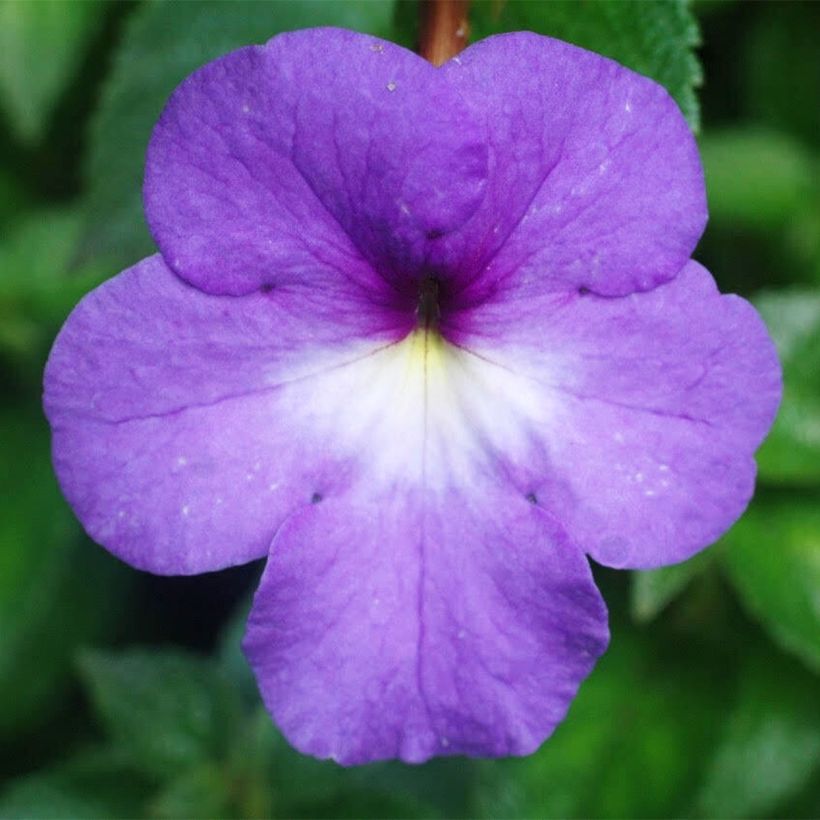

Plant habit
Flowering
Foliage
Botanical data
Achimene
x hybridum
Bleu
Gesneriaceae
Cupid's Bower, Hot Water Plant, Magic Flower
Cultivar or hybrid
Planting and care
Plant your Achimenes in the spring in a light substrate, composed of a mixture of peat and compost, preferably acidic. The rootstocks should be placed under 3 to 4cm (1 to 2in) of compost. Place them in partial shade, in a bright location but away from direct sunlight. Be careful of windy areas and drafts, as the stems are fragile. These tropical plants appreciate slightly humid atmospheres and warmth during the growth period, and they cannot tolerate temperatures below 10°C (50°F). They are often cultivated indoors, at temperatures above 16°C (60.8°F) during the growth period (from spring to the end of summer).
Stop watering in September, the foliage will naturally dry out. Cut it back. Dig up the rootstocks and store them in dry sand, for example in a cupboard in a cool room. They will spend the winter there. Winter rest is essential for a beautiful flowering. Around March, you will replant them, place them in a bright location, and gradually resume watering. Apply half a dose of soluble fertilizer for flowering plants three to four weeks later, then once a month to support flowering. Prefer watering with non-calcium water (rainwater or Volvic mineral water, for example). Water regularly, but without excess, and do not wet the foliage. Do not leave a saucer filled with water under the pot, as this could cause the rootstocks to rot.
Regularly remove faded flowers, this will promote the emergence of new flowers. To encourage the plant to branch out, you can pinch the tips of the stems during the first month of growth.
A slightly wide pot or hanging basket can accommodate several rootstocks that will form a beautiful clump.
Planting period
Intended location
Care
-
, onOrder confirmed
Reply from on Promesse de fleurs
Similar products
Haven't found what you were looking for?
Hardiness is the lowest winter temperature a plant can endure without suffering serious damage or even dying. However, hardiness is affected by location (a sheltered area, such as a patio), protection (winter cover) and soil type (hardiness is improved by well-drained soil).

Photo Sharing Terms & Conditions
In order to encourage gardeners to interact and share their experiences, Promesse de fleurs offers various media enabling content to be uploaded onto its Site - in particular via the ‘Photo sharing’ module.
The User agrees to refrain from:
- Posting any content that is illegal, prejudicial, insulting, racist, inciteful to hatred, revisionist, contrary to public decency, that infringes on privacy or on the privacy rights of third parties, in particular the publicity rights of persons and goods, intellectual property rights, or the right to privacy.
- Submitting content on behalf of a third party;
- Impersonate the identity of a third party and/or publish any personal information about a third party;
In general, the User undertakes to refrain from any unethical behaviour.
All Content (in particular text, comments, files, images, photos, videos, creative works, etc.), which may be subject to property or intellectual property rights, image or other private rights, shall remain the property of the User, subject to the limited rights granted by the terms of the licence granted by Promesse de fleurs as stated below. Users are at liberty to publish or not to publish such Content on the Site, notably via the ‘Photo Sharing’ facility, and accept that this Content shall be made public and freely accessible, notably on the Internet.
Users further acknowledge, undertake to have ,and guarantee that they hold all necessary rights and permissions to publish such material on the Site, in particular with regard to the legislation in force pertaining to any privacy, property, intellectual property, image, or contractual rights, or rights of any other nature. By publishing such Content on the Site, Users acknowledge accepting full liability as publishers of the Content within the meaning of the law, and grant Promesse de fleurs, free of charge, an inclusive, worldwide licence for the said Content for the entire duration of its publication, including all reproduction, representation, up/downloading, displaying, performing, transmission, and storage rights.
Users also grant permission for their name to be linked to the Content and accept that this link may not always be made available.
By engaging in posting material, Users consent to their Content becoming automatically accessible on the Internet, in particular on other sites and/or blogs and/or web pages of the Promesse de fleurs site, including in particular social pages and the Promesse de fleurs catalogue.
Users may secure the removal of entrusted content free of charge by issuing a simple request via our contact form.
The flowering period indicated on our website applies to countries and regions located in USDA zone 8 (France, the United Kingdom, Ireland, the Netherlands, etc.)
It will vary according to where you live:
- In zones 9 to 10 (Italy, Spain, Greece, etc.), flowering will occur about 2 to 4 weeks earlier.
- In zones 6 to 7 (Germany, Poland, Slovenia, and lower mountainous regions), flowering will be delayed by 2 to 3 weeks.
- In zone 5 (Central Europe, Scandinavia), blooming will be delayed by 3 to 5 weeks.
In temperate climates, pruning of spring-flowering shrubs (forsythia, spireas, etc.) should be done just after flowering.
Pruning of summer-flowering shrubs (Indian Lilac, Perovskia, etc.) can be done in winter or spring.
In cold regions as well as with frost-sensitive plants, avoid pruning too early when severe frosts may still occur.
The planting period indicated on our website applies to countries and regions located in USDA zone 8 (France, United Kingdom, Ireland, Netherlands).
It will vary according to where you live:
- In Mediterranean zones (Marseille, Madrid, Milan, etc.), autumn and winter are the best planting periods.
- In continental zones (Strasbourg, Munich, Vienna, etc.), delay planting by 2 to 3 weeks in spring and bring it forward by 2 to 4 weeks in autumn.
- In mountainous regions (the Alps, Pyrenees, Carpathians, etc.), it is best to plant in late spring (May-June) or late summer (August-September).
The harvesting period indicated on our website applies to countries and regions in USDA zone 8 (France, England, Ireland, the Netherlands).
In colder areas (Scandinavia, Poland, Austria...) fruit and vegetable harvests are likely to be delayed by 3-4 weeks.
In warmer areas (Italy, Spain, Greece, etc.), harvesting will probably take place earlier, depending on weather conditions.
The sowing periods indicated on our website apply to countries and regions within USDA Zone 8 (France, UK, Ireland, Netherlands).
In colder areas (Scandinavia, Poland, Austria...), delay any outdoor sowing by 3-4 weeks, or sow under glass.
In warmer climes (Italy, Spain, Greece, etc.), bring outdoor sowing forward by a few weeks.































